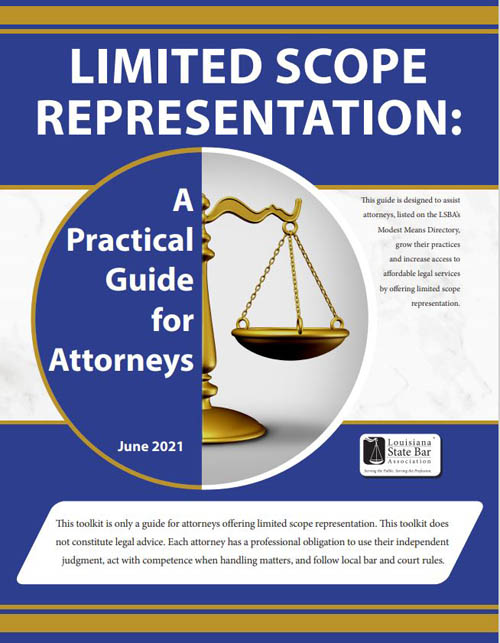Limited Scope Representation Toolkit

The LSBA Access to Justice Commission developed this
toolkit as a guide for attorneys interested in offering limited scope representation (LSR), also referred to as unbundled or a la carte. LSR or unbundling allows clients to hire an attorney to assist them with part of their case, such as drafting documents or appearing at a single hearing and can often be the difference between someone being able to obtain representation versus going unrepresented without legal help. LSR can be particularly helpful for people who do not qualify for legal services – they make too much, free legal aid is not available for the type of case, or they are conflicted out – but cannot afford traditional market rate legal services.
The toolkit contains practice resources for attorneys including: the rules governing limited scope representation, commonly asked questions and best practices, forms, sample engagement and disengagement letters, and other helpful resources. It is specifically geared to help attorneys offering limited scope representation through the
Modest Means Directory. For more resources and information like this, join the Modest Means Directory. Attorneys who offer affordable legal services through the Directory have access to free CLEs, forms, and resource guides.
The guide and resources below are only for attorneys offering limited scope representation. The information provided does not constitute legal advice. Each attorney has a professional obligation to use their independent judgment and follow local court rules. Any forms identified as "sample" should be used as such.
Limited Scope Representation Guide and Resources
Limited Scope Representation (LSR) and Access to Justice
Frequently Asked Questions about Limited Scope Representation
LSR, sometimes called "unbundling," allows a client and his/her lawyer to agree that the lawyer will provide limited services to the client. This means the lawyer will represent the client only on a certain issue or matter rather than representing the client for the entire scope of the legal matter.
Yes. LSR is permissible under Louisiana Rule of Professional Conduct 1.2(c). Attorneys making a limited appearance in a court proceeding or litigation matter should file a "Notice of Limited Appearance" form for family and non- family matters in accordance with Louisiana District Court Rule 9.12.
LSR can benefit clients, lawyers, and the courts. Clients get legal help they could not otherwise afford. Lawyers earn fees they would not otherwise have received. Courts benefit from greater efficiency and resource allocation.
Lawyers gain access to a larger pool of clients who can pay some fees but cannot afford full-service representation. Lawyers usually offer LSR services for an upfront flat fee, which eliminates the risk of non-payment. Most clients who choose LSR are choosing between LSR or no representation, but many lawyers report that clients sometimes opt for full representation once they have discussed their legal matter with a lawyer. LSR is also an additional way for lawyers to fulfill their ethical and professional duties to provide access to justice.
LSR is not suitable for every legal matter. It is the lawyer's responsibility to decide if LSR is suitable for a particular situation. The lawyer must ensure that the client understands the limits of the representation. The lawyer should also consider the ramifications of dividing issues in the legal matter, the complexity of the legal matter, the lawyer's knowledge of the legal matter, and the client's understanding of the limitation of issues.
LSR can be used in many areas of legal practice and is particularly well-suited for use in family law. LSR can be beneficial for sole practitioners, new lawyers, and small firms that want to expand their practices and generate income through a non-traditional method.
Lawyers who carefully follow the rules governing LSR should not be at any greater risk for committing malpractice. The key to avoiding a LSR-related malpractice claim is to have a clear understanding with your client regarding the scope of representation. Malpractice insurance carriers suggest attorneys be as specific as possible and explain what they will and will not be responsible for doing. Reducing the scope of representation to a written document signed by the client can further support clear understanding with your client regarding the scope of the representation. As a best practice, do not go beyond the LSR agreement or take on additional tasks without again documenting the new agreement in writing. When the work is complete, confirm the completion in writing to the client and file the proper forms with the court, if applicable.